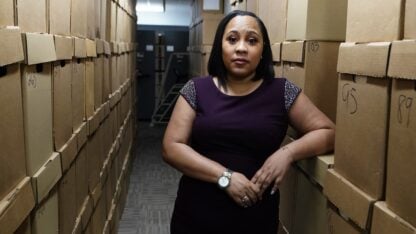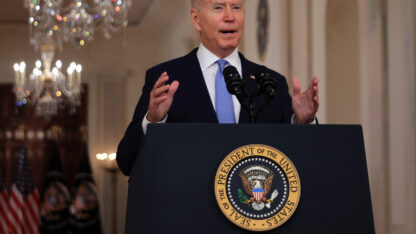Judge Tosses Challenge To Result Of Lieutenant Governor’s Election

In the election, Republican Geoff Duncan, seen here, defeated Democrat Sarah Riggs Amico by about 123,000 votes.
John Bazemore / Associated Press
Updated Tuesday at 10:22 a.m.
There is not enough evidence to put the result of Georgia’s 2017 lieutenant governor’s race in doubt, according to the ruling Friday of Cobb County Superior Court Senior Judge Adele P. Grubbs.
In the election, Republican Geoff Duncan defeated Democrat Sarah Riggs Amico by about 123,000 votes. But it’s the total number of votes in that contest that have drawn questions.
About 160,000 fewer votes were cast in the lieutenant governor’s race than in the governor’s race between Republican Brian Kemp and Democrat Stacey Abrams. And 82,000 fewer votes were cast in the lieutenant governor’s race than the attorney general’s race.
Ed Lindsey, a lawyer for Duncan, cheered the judge’s ruling.
“The people of Georgia should be able to rest assured on the evidence, as ruled by Judge Grubbs, that the election was accurate not only in this race, but in all the other races cast on November 6th,” Lindsey said.
The judge has ruled that Duncan is the “duly-elected lieutenant governor at this time,” he said.
But it’s difficult, if not impossible, to prove that vote totals in Georgia are accurate because the state’s voting system lacks a paper trail that can be audited.
That’s part of why cybersecurity experts agree Georgia’s electronic-only voting machines are vulnerable to hacking.
State lawmakers and election officials mostly agree Georgia should replace its current machines with a paper-based system by 2020. A federal court has suggested it could force the state to make the switch.
In her ruling from the bench, Judge Grubbs acknowledged experts call Georgia’s voting system “terrible.” But, she said “there’s absolutely nothing to support” that there was enough misconduct, illegal votes, or legal votes rejected, to place in doubt the result of the lieutenant governor’s race.
“There is a legal presumption that the election returns are valid,” said Judge Grubbs.
The Coalition for Good Governance, a nonprofit that advocates for paper ballots, brought the election challenge, and plans to appeal the judge’s decision. Amico, the Democrat, is not challenging the election result, although she has raised questions about it repeatedly.
Bruce Brown, the Coalition’s attorney, argued reports of malfunctioning machines, previous security breaches in the state’s voting system, and the weird vote totals raise even more doubts about the results of the election for lieutenant governor.
“The evidence of who got what votes is in a black box, and that is in the election system, and the government won’t let the people see it, and this decision supports that framework,” said Brown.
On Monday, experts and lawyers for The Coalition for Good Governance went to a Fulton County warehouse to inspect the internal memory of electronic voting machines housed there as part of court-ordered discovery.
But they were effectively barred from inspecting the memory after Ryan Germany, lawyer from Georgia’s Secretary of State, gave instructions to Fulton officials, according to The Daily Report.
Georgia’s Secretary of State was dismissed from the case days earlier.
On Monday, experts and lawyers for The Coalition for Good Governance went to a Fulton County warehouse to inspect the internal memory of electronic voting machines housed there as part of court-ordered discovery.
But they were effectively barred from inspecting the memory after Ryan Germany, lawyer from Georgia’s Secretary of State, gave instructions to Fulton officials, according to The Daily Report.
Georgia’s Secretary of State was dismissed from the case days earlier. But the Secretary of State’s office argued the way the Coalition wanted to inspect the machines was not permitted under the judge’s order.
Grubbs ultimately ruled against Coalition’s request for a delay in the trial.
During oral arguments, Brown, an attorney for the Coalition, repeatedly brought up the organization’s inability to inspect the machine.
He was repeatedly reprimanded by Grubbs for doing so, who pointed out she had already ruled on the issue.
This story has been update to provide more context about evidentiary issues in the case.







